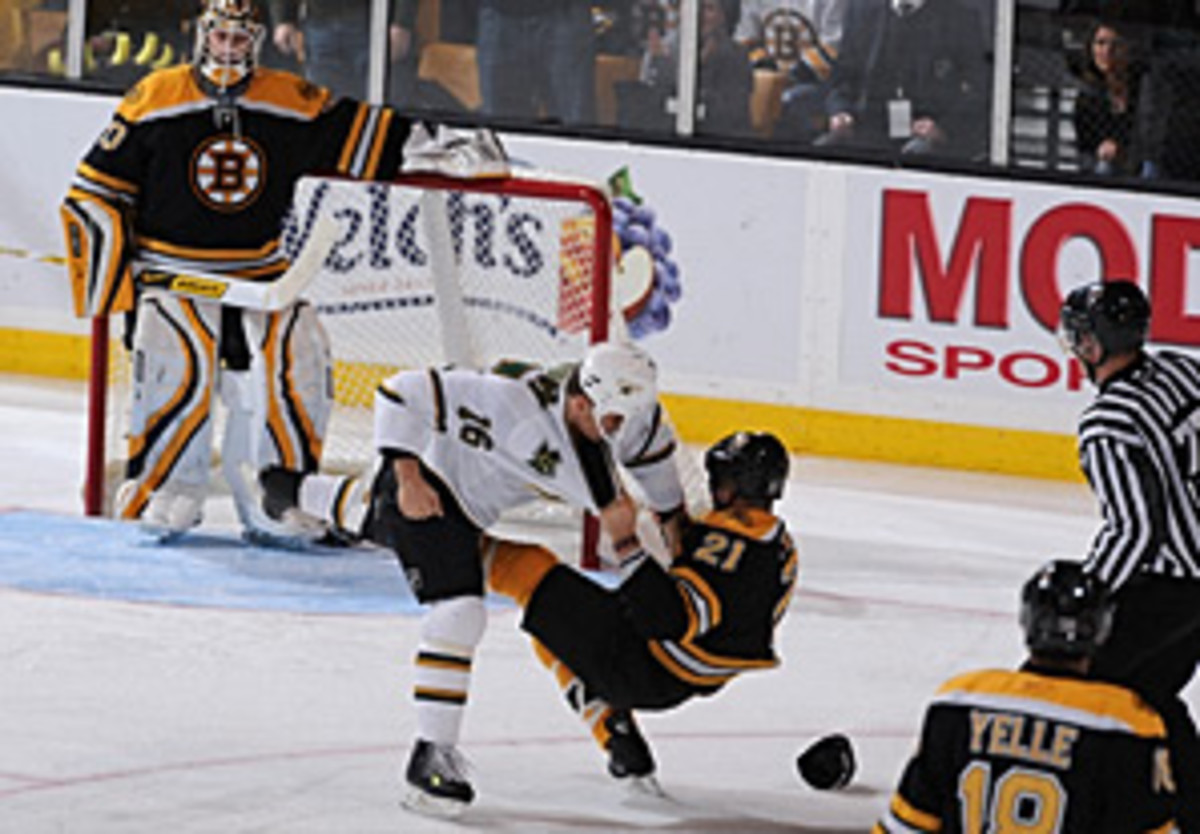In defense of fighting
What ensued was one of the best back-and-forth bouts I've seen in a long, long time. Both participants rocked the other with devastating punches, yet neither would take a knee. Orr absorbed a straight right that buckled and left him holding on only to get a second wind and continue the set-to. In all, the two men tangled for a minute and 20 seconds with exhaustion the final outcome.
The fans at the Garden stood and cheered in unison -- loving the action and acknowledging the effort of both hometown hero Orr and opponent Boulton. Bench shots from television showed players on their feet, banging their sticks against the boards in appreciation, with many guys sharing quick quips and crooked grins. In other words, the building was energized for everyone involved -- fans, players and broadcasters alike. Two nights later in Boston, a series of scraps sparked by Stars agitators Sean Avery and Steve Ott and hailed on air as "old time hockey" had the same effect on the crowd and the players, though not to Dallas's advantage. Ott also took his fair share of heat for refusing to drop his gloves and finish what he started with a pair of nasty hits on Stephane Yelle and Mark Stuart that drew the ire of Thornton and Shane Hnidy.
Watching the bout in New York got me to thinking that there may be no more polarizing issue in all of sport than fighting's place in the game of hockey. For Boulton, it was simply a matter of trying to send a jolt through his teammates after a lopsided loss at home in their previous game and a couple of tentative shifts to begin the affair against the Rangers. His solution? Change it up by mixing it up, and the reaction and energy derived from his bout was positive although the Thrashers ended up losing, this time by a more respectable count of 3-2. For Ott and Avery in Boston, it was a matter of trying to drive their opponents to distraction in a close game, although their efforts ultimately backfired with the ensuing fights energizing the Bruins.
Now, I know where I stand on the whole topic. I thoroughly enjoy a good fight for all the reasons I witnessed at the Garden. I don't view it as a blight on the game, but rather as a unique aspect of the NHL that has survived scrutiny and political correctness. So be it. Fighting doesn't define or demean hockey in my mind. It is merely one of many elements that sets the game apart.
In the context of that fight in New York, both men did their respective jobs in the moment and the rest of the evening as well, sticking to skating and forechecking in select situations. For the remaining players, the game was fast-paced, well-played and had no residual cheapness or chippiness, unlike the Stars battle with the Bruins. That early bout between Orr and Boulton wasn't gratuitous -- just part of a game unfolding along the way in a long season; no different than any occurrence that might change momentum, but doesn't necessarily do so. If anything, the fights ignited by Avery and Ott also ignited the Bruins who were determined to get a hunk of Ott at all costs while making the Stars' pests think twice before engaging in disruptive actions.
Maybe people struggle with the notion of fighting existing at all because it seems like a classic contradiction: a brutish pursuit within a game capable of swift-skating beauty. To me, though, the point is that hockey is the ultimate team game and a sense of togetherness is paramount to competitive relevance. As such, answering physical challenges in the mode of survival of the fittest is often times part of the process. See: Bruins defenseman Andrew Ference, who took it upon himself to lay Ott out with a crushing hit and then respond in kind to Avery's fistic retaliation.
Notice I said part of the process. The Detroit Red Wings won the Stanley Cup last season with the fewest fighting majors. The previous champ, the Anaheim Mighty Ducks, hoisted the Cup after dropping the gloves more than any team. All of which proves that fighting doesn't guarantee success, nor does it preclude a team from being successful.
It's simply a matter of choice.
To me, that's the best argument of all when it comes to the right to fight debate.





